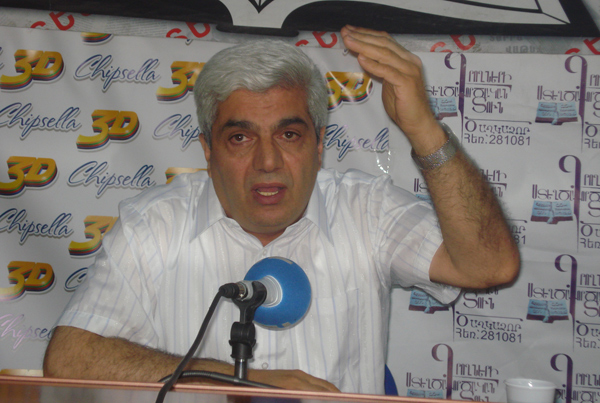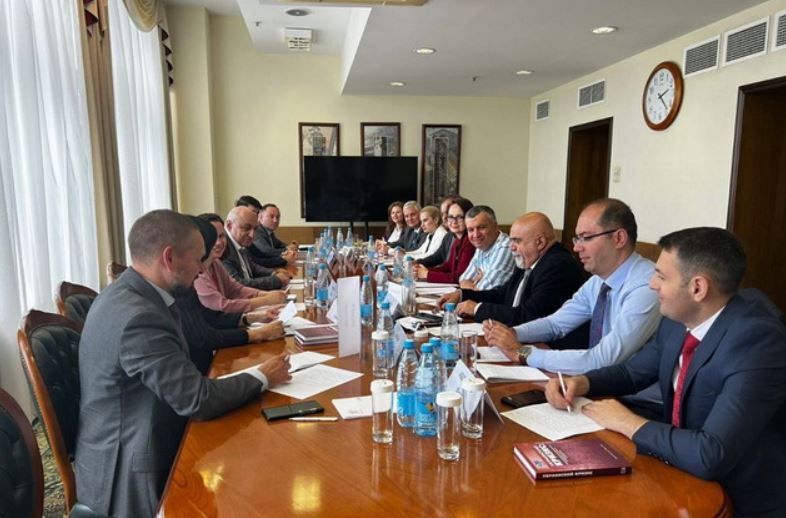Political scientist Stepan Grigoryan about the latest developments of the Armenian-Azerbaijani relations
“The Azerbaijani policy over these 25 years was very distinct: to increase the level of sovereignty, to build oil pipelines and gas pipelines by bypassing Russia. They had these resources and wanted not only to transport them to Europe or Africa through Russia but also by their own way. Here, it is distinct that they do not want to build a democratic country, but want to build a country that seeks to maintain its sovereignty. But, now, we notice that Azerbaijan has changed its policy,” said political scientist and director of the Center for Globalization and Regional Cooperation, Stepan Grigoryan, in the interview with “Aravot”, referring to the shift of Azerbaijani political vector and starting to win the favor of Russia.
According to him, one of the reasons is directly associated to the events of the centenary of the Armenian Genocide. Mr. Grigoryan points out to the close relations between Azerbaijan and Turkey. These countries with the formula of one nation – two states have a number of military partnership agreements with each other, Turkey supports Azerbaijan in the international community, the Armenian genocide in Azerbaijan is becoming more denial than just in Turkey. “The 100th anniversary of the Armenian Genocide changed a lot. The recent developments associated with the anniversary: the recognition of the Genocide by key states, the Mass of the Pope of Rome, adoption of resolution by the European Union, the speech delivered by the president of Germany and so on, showed that none of the ambassador’s recall would help Turkey. Azerbaijan realized that Turkey is not so strong to be able to help it on Nagorno-Karabakh issue. Azerbaijan began making an attempt of search, for instance, by winning the favor of Russia, trying to resolve the Karabakh issue in its own favor. Aliyev proves it by his not going to Riga. This was a message not directed to Europe, but Russia,” says Mr. Grigoryan.
It is noticeable that recently, Aliyev’s administration pours much more threats and challenges to the West, accusing the latter of interfering in the domestic political affairs of Azerbaijan. The corruption revelations about Aliyev and his family, naturally, do not have a constraining role but become a cause for subsequent arrests and oppressions ordered by him. In this respect, the political scientist says, “Azerbaijan is purposefully and consciously going towards isolation.” Mr. Grigoryan believes that, thus, Azerbaijan is going toward Russia. “When you are forming a rigid authoritarian state, it is evident that your positions in Europe are weakening, it is obvious that Europe will criticize you for your political prisoners. Azerbaijan, in its turn, gives tough answers to the international structures, but Europe already does not forgive it. If previously they were supporting: money, oil, caviar, now, they are not helpful. Their criticism addressed to the US and Europe furthermore complicates their situation. Certainly, Russia will get use of it. Certainly, it will not give Karabakh to Azerbaijan, but thus it will strengthen its influence in Azerbaijan.”
Read also
The repression going on in Azerbaijan, on the other hand, the social problems, according to Mr. Grigoryan, will cause unrest among the public and the demonstrations are not excluded. “But since their government has a lot of money and the repressive machinery is very strong, Aliyev will preserve his power. No matter how much they protest and complaint, it will not lead to a big wave, however, Azerbaijan has other threat: when you are oppressing the political opposition, arrest all your opposition members, eventually extremist forces come out against you, they might be forces from religious organizations that have been educated in the Middle East and have returned home. They do not like that this country, yes, is corrupt, but at the same time, it is secular,” says Mr. Grigoryan and notes, – We should not forget about the terrorists from religious organizations who do not like to ask questions and shoot immediately. They represent a danger not only for Azerbaijan but also for the region. Aliyev’s administration is bad, yes, we slam, it is bad that the human rights are violated, but they are secular leaders, it is another risk that the religious-based groups become stronger… If some five years ago, such scenarios seemed marginal, now, they become already tangible.” We also spoke with Mr. Grigoryan about the ECHR verdicts on “Chiragov and Others v. Armenia” and “Sargsyan v. Azerbaijan” claims, according to which, the rights to the two families to their former possessions should be restored that were violated as a result of the war in 1992-1994. “This issue should not be viewed in the context of the Nagorno-Karabakh conflict settlement. I cannot visualize its solution. The NKR problem is a serious political, a self-determination issue while here, there is a specific human problem. Let the governments decide on how they are going to solve them,” says Mr. Grigoryan.
The political scientist sees the settlement of Nagorno-Karabakh conflict only in the policy change of Azerbaijan. “Unless the atmosphere is changed, unless Azerbaijan changes its unilateral posture, the situation will not change, because Azerbaijan definitely conducts a political campaign,” says Mr. Grigoryan noting that the current situation is neither favorable for Armenia nor for Azerbaijan. “Alas, Armenia and Azerbaijan are not ready to solve the problem, but its cost is very expensive. Formally, we are controlling over Karabakh, the Armenians here are self-determined, but de jure, it is not fixed, the issue is not resolved. In addition, both Armenia and Azerbaijan spend resources on keeping the army and neglecting the social conditions of the country, thus, they depreciate each other, which in the end will lead to the fact that the two states will appear in the zone of Russia’s influence, which we were already seeing in Armenia, now, it is observed in Azerbaijan.”
Hripsime HOVHANNISYAN,
“Aravot” daily























































